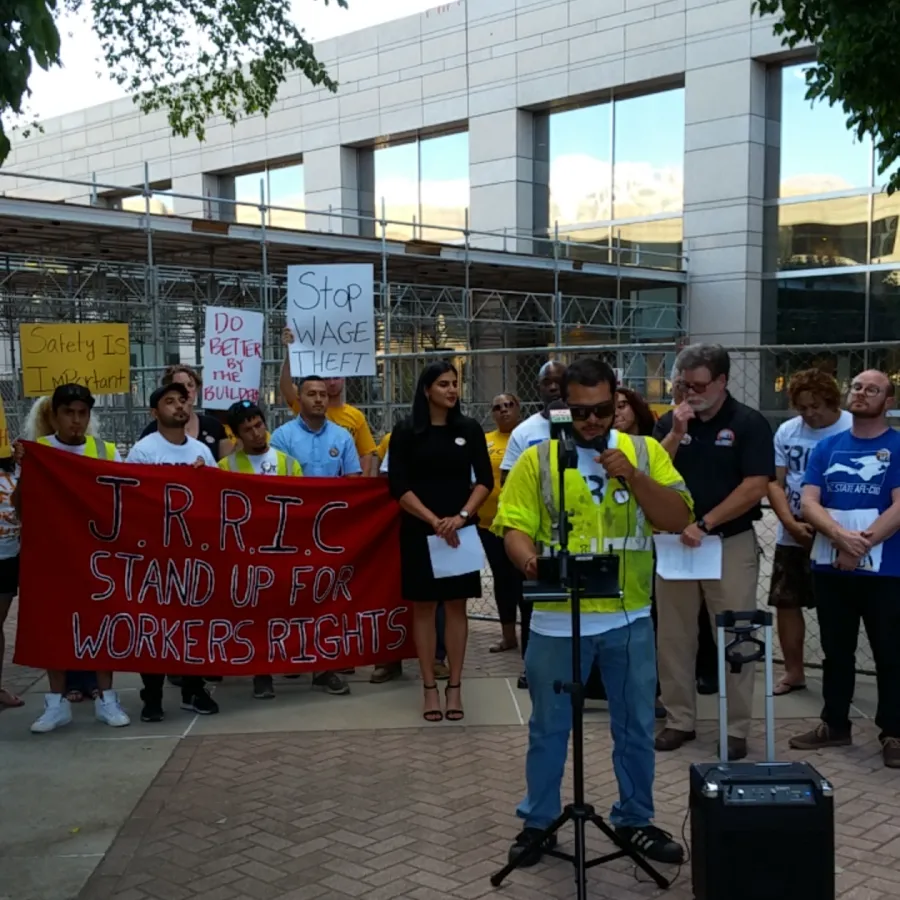Charlotte Construction Workers Urge City Council to Act on Reported Industry Abuses

FOR IMMEDIATE RELEASE
Contact: Jeremy Sprinkle, 336-255-2711, jeremy@aflcionc.org
Construction Workers and Community Advocates Call for Charlotte City Council to Act on Reported Abuses in the Industry
“Build a Better South” report highlights issues plaguing the construction industry in the U.S. South, including wage theft, low wages, and safety concerns
As cities in the South continue to boom, construction workers earn poverty level wages and face working conditions made more dangerous by a lack of formal training and insurance benefits
Highly skilled and fairly paid unionized building trades workers in Charlotte point to a high road not taken by Queen City contractors
Download a one-pager with facts from the study about Charlotte (PDF)
(http://bit.ly/bbcltfacts)
(Charlotte, NC) -- People harmed while working in Charlotte’s booming construction industry joined community, faith, and labor advocates and the co-authors of a new study of industry working conditions across the South on Monday to call for the city council to pass policy that would encourage developers to disclose their contractors’ employment practices as part of future rezoning petitions.
Watch recorded Facebook Live video of the press conference.
“I’m proud to be building Charlotte’s future, but the working conditions I've experienced are nothing for Charlotte to be proud of,” said industry worker Alexis Gonzalez, who spoke at a press conference before the city council meeting. While working for Border Rebar at Charlotte Douglas International Airport, Alexis said he has had to scavenge for fresh drinking water, operate dangerous equipment without any training, and work without basic professional protection equipment like gloves and safety glasses being provided by his employer.
Build a Better South, the study by Partnership for Working Families, Workers Defense Project, and the University of Illinois-Chicago, revealed that, despite the widely held belief that construction jobs are “good blue collar jobs,” many construction workers are struggling from unsafe and precarious work, low wages and wage theft, a lack of access to benefits and workers’ compensation, and the exploitation of unskilled and immigrant labor.
Construction workers in Charlotte surveyed with the support of Action NC and the Latin American Coalition found that 44 percent of people working in the industry in Charlotte do not receive benefits of any kind - not even workers’ compensation insurance. Less than a third of industry workers are offered health insurance through their employer, and only 1 in 10 workers have any formal training in how to do their job safely and efficiently. Low wages and employer workplace fraud - including wage theft and the improper classification of employees as independent contractors - combine to keep many workers trapped in poverty.
The availability of fairly compensated and highly trained unionized building trades people in the Charlotte area is an example of the high road not taken by Queen City contractors, according to Scott Thrower, president of the International Brotherhood of Electrical Workers Local 379, who also spoke at the press conference. “A true apprenticeship can and will prepare anyone for a life in construction by educating you in the construction trade,” said Scott.
Jackie Cornejo of the Partnership for Working Families, who co-authored Build a Better South, said there are concrete steps City Council can take to get there. Workers and advocates recommended City Council encourage developers to disclose their contractors’ employment practices as part of rezoning efforts.
For example, the Council could direct staff to study the creation of a point system that would encourage developers to demonstrate that they are following all state and federal labor laws and to adopt Responsible Contractor Policies that would provide a just, equitable, and safe worksite for their construction workforce. By including these voluntary disclosures in the public hearing process, Charlotte could encourage the same transparency in contractor employment practices as environmental impact and design assessments.
###
The North Carolina State AFL-CIO is the largest association of local unions and union councils in North Carolina, representing a hundred and thirty thousand union members, fighting for good jobs, safe workplaces, workers’ rights, consumer protections, and quality public services on behalf of ALL working people. PO Box 10805, Raleigh, NC 27605.
